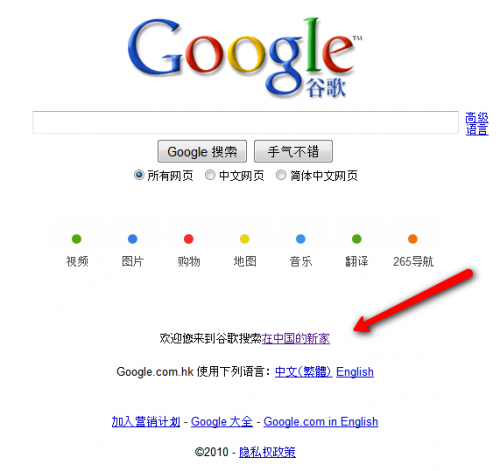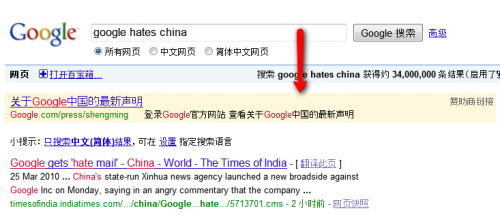Google China: Congressional Praise; Microsoft Supports Tyranny & Google Eats Poo Cartoon
The reactions to Google’s partial withdrawal from China continue. Yesterday, there were hearings in the US Congress where representatives showered praise on Google while competitor Microsoft was said to be supporting tyranny. Meanwhile, there is a nice round-ups of reactions from China folks on the web, including a great cartoon of something you never see […]

The reactions to Google’s partial withdrawal from China continue. Yesterday, there were hearings in the US Congress where representatives showered praise on Google while competitor Microsoft was said to be supporting tyranny. Meanwhile, there is a nice round-ups of reactions from China folks on the web, including a great cartoon of something you never see — Google being forced to eat shit.
CNN Money has the congressional rundown where Google received plenty of praise for its move. Representative Chris Smith, a Republican from New Jersey, called Google’s move:
A remarkable, historic and welcomed action.
Smith also had some harsh words for Microsoft:
They [Microsoft] need to get on the right side of human rights rather than enabling tyranny, which they’re doing right now.
Frankly, I’m feeling a little sorry for Microsoft. Google is still providing censored search results to its partners in China — and those partners combined probably have more marketshare than Bing has in China. So Google is probably supporting tyranny via censorship a heck of a lot more than Microsoft.
Meanwhile, Google remains in China overall. It hasn’t pulled out. It’s played a game where it still wants on the ground operations that will produce revenue that in part help support some of that tyranny that Smith is worried about. Despite all this, Google’s cashing in on some nice PR. Maybe that 1500% increase in Google’s government lobbying spending is paying off.
My post from yesterday, So Now Google Thinks Everyone Should Care About Chinese Censorship?, goes into more depth about Google’s half-measures in China. As I say in the post, I’m glad Google has ended most of its censorship. But if the company wants to be a poster child for the world, why doesn’t it fully leave?
As for Bing, China watcher Rebecca MacKinnon has a nice piece about Bing being in China. Rather than supporting tyranny, she seems to feel it has a tough road to walk trying to balance providing good information but complying with government demands. This is the same road that until two months ago Google was happy to walk.
MacKinnon also points to a great round-up of reactions from various Chinese netizens from ChinaSMACK. Some are positive of Google’s move, such as:
Compared to Google, Baidu is simply garbage.
Only knowing how to take money and put advertisements, with all the search results being advertisements for garbage.
The principle of web search is that what you searched for is what is, so manipulated search results is simply garbage.
We can all think, we don’t need other people to tell us what is right and what is wrong, we can collect information from various angles and judge for ourselves, only those people who have done guilty things would screen/filter information.
And:
Google will forever be in my heart!
Some are negative, such as:
Google is only a company, it has no right to make irresponsible remarks about China’s affairs. Those who can observe China’s laws, China more than welcomes, but those who cannot observe, please find another place to go, we definitely won’t force you to stay. During this Google incident, Google has clearly overestimated itself, thinking it can hold hostage the governments of both China and America, only regretting that in the end it “tried to steal the chicken but lost the bait” [started out trying to hurt others but ended up being hurt], and allowed itself to dejectedly be swept out the door.
And:
Google is simply insulting us, repeatedly saying it will withdraw from China, but now running to Hong Kong. Hong Kong is also China’s. This is truly insisting on being shameless. Without you, Chinese people will live on as usual. With you, it is extremely annoying. Hope you will never come back.
Perhaps some of the negative comments are why Google’s now added, as noted by the Los Angeles Times, a link to a statement in Chinese explaining why it moved from Google.cn to Google.com.hk this week. The home page link, as translated by Google Translate, says:
Welcome to Google search in China’s new home
Here’s where it appears on the Google.com.hk home page:
The LA Times also noted that Google is running ads to get its corporate message across. For example, in a search for google hates china, I get this:
The ad leads back to the same statement as listed on the home page. Oddly, I don’t get this ad for the same search in Chinese. Similarly, I get it for google china in English but not the same in Chinese.
Google’s commonly run such house ads for controversial searches to explain its positions in the US, including for its initial announcement that it might leave China in January. Google Buys Search Ad In Response To The China Decision has more background on this.
Finally, back to that round-up of reactions. Among them was the comic that I highlighted with one pane above. Here’s the entire thing, apparently showing Google being tired of eating the shit served up by the Chinese authorities that it chooses to walk away from the table, leaving things to other players — Baidu, I assume, along with SoSo and Sogou.
According to MacKinnon, Google’s saying “Too f***ing stinky! I’m not f***ing eating with you guys anymore!”
I haven’t been able to track down the original source of the cartoon — I’ll update that, if I can find it.
For related news, see Techmeme.
Postscript: I sent a few follow-up questions to Google. Here’s what I received back from Gabriel Stricker with their communications team.
Who exactly are the partners you’re still supplying censored results to?
We have over a dozen syndication deals with partners in China. We obviously have contractual obligations to them, which we want to honor. Over time we will not be syndicating censored search to partners in China, but we will of course fulfill our existing contractual obligations.
I’d like to better understand why you’re simply not out of China entirely. What do you really need on the ground? Why stay there at all?
The issue for us has always been censorship, and the lack of transparency around removals and take downs in China. Whether we have a sales team or R&D facilities there is irrelevant to this central issue.
We believe that our new approach — serving mainland Chinese users via an uncensored service in simplified Chinese on Google.com.hk–will meaningfully increase access to information for people in China.
I’m trying to still figure out how we got from Google gets hacked to this turning into an issue over censorship. It seems like you should just be out.
We do believe in engagement over estrangement–and we want to provide our services to as many people as possible globally. When we launched our service in China we did so in the belief that the benefits of increased access to information for people in China and a more open Internet outweighed our discomfort in agreeing to censor some search results. The recent cyber attacks and the surveillance they have uncovered — as well as attempts over the past year to limit free speech on the web even further — led us to conclude that we were no longer comfortable censoring results in China.
Contributing authors are invited to create content for Search Engine Land and are chosen for their expertise and contribution to the search community. Our contributors work under the oversight of the editorial staff and contributions are checked for quality and relevance to our readers. The opinions they express are their own.
Related stories


